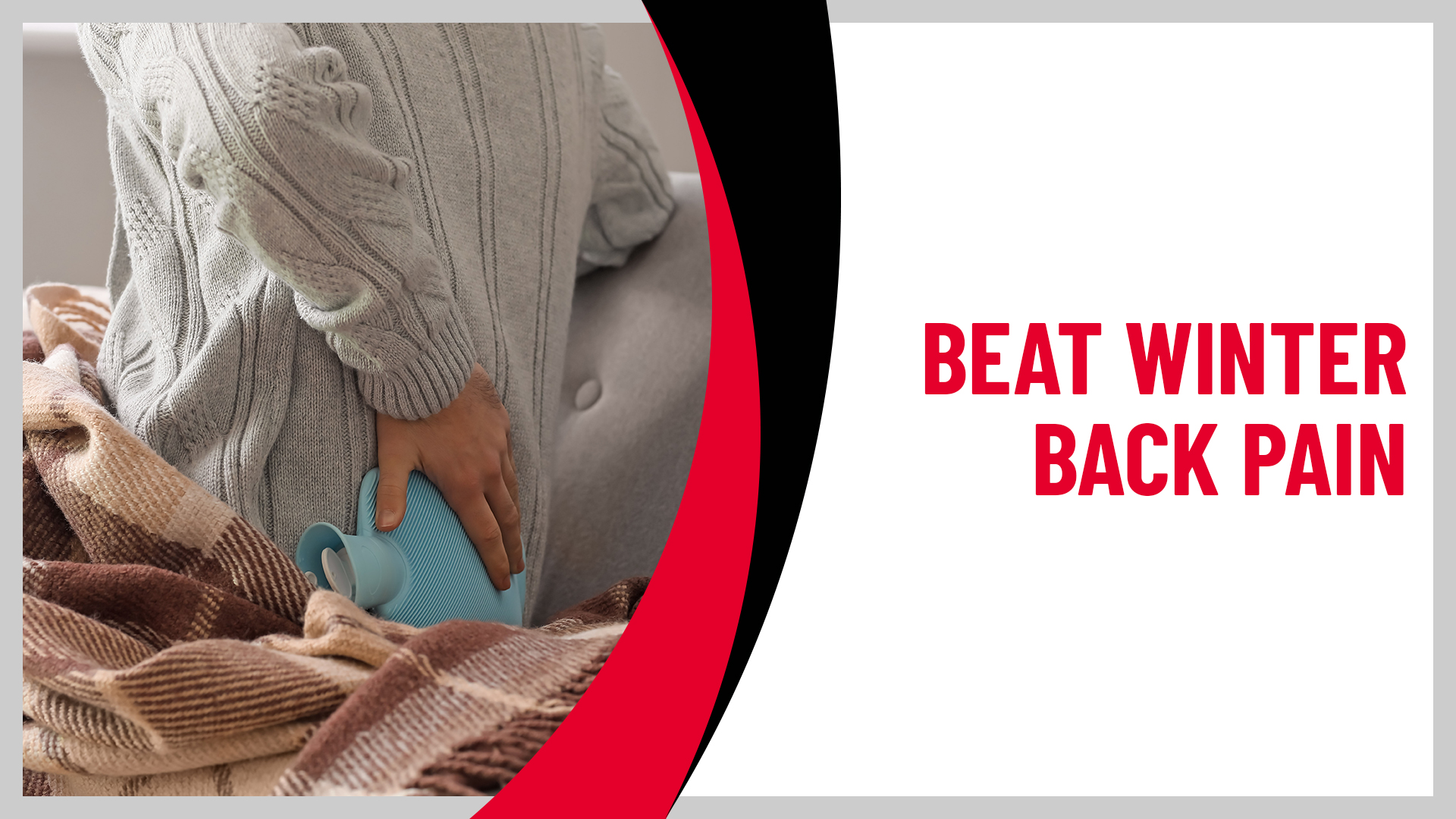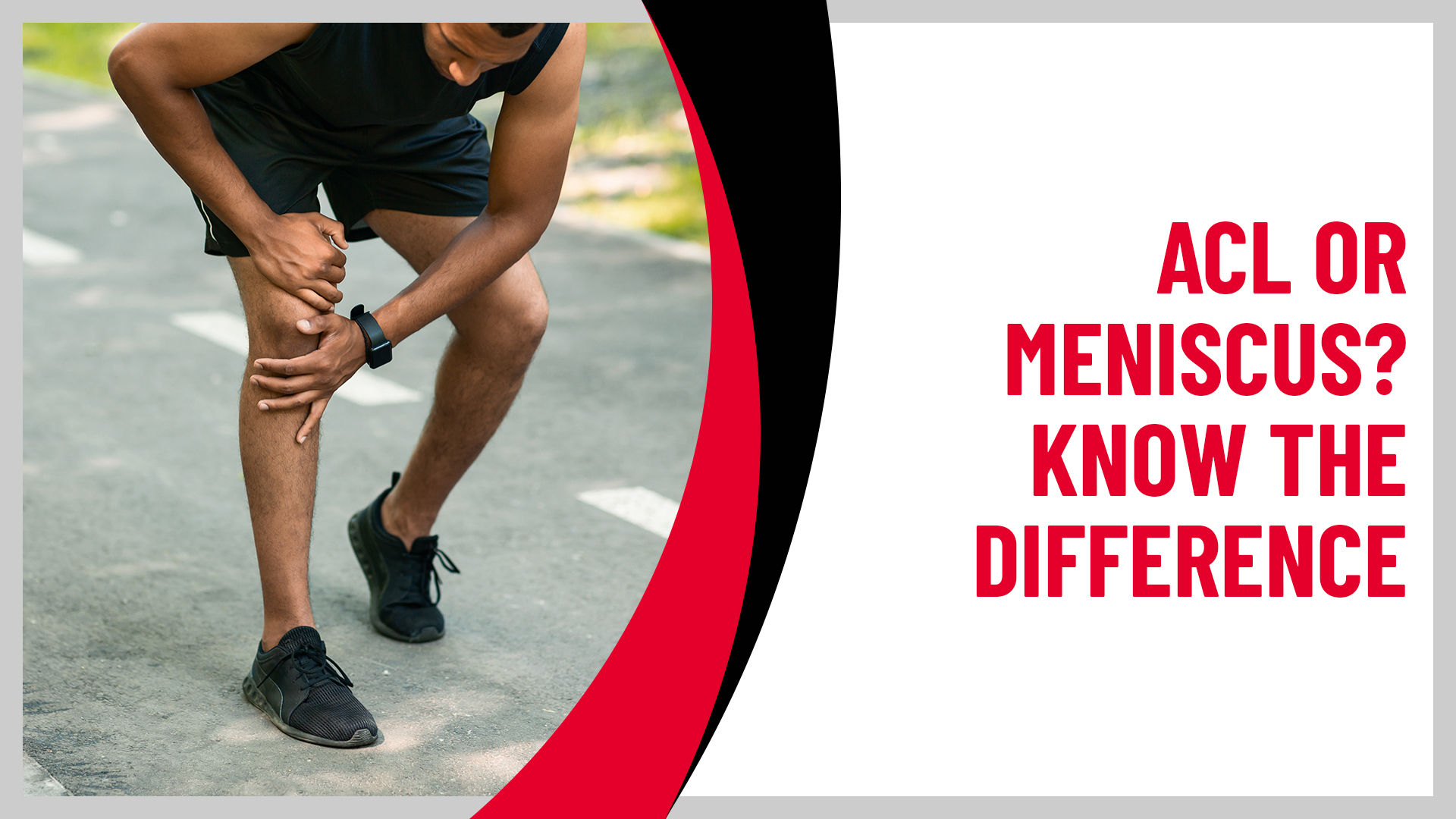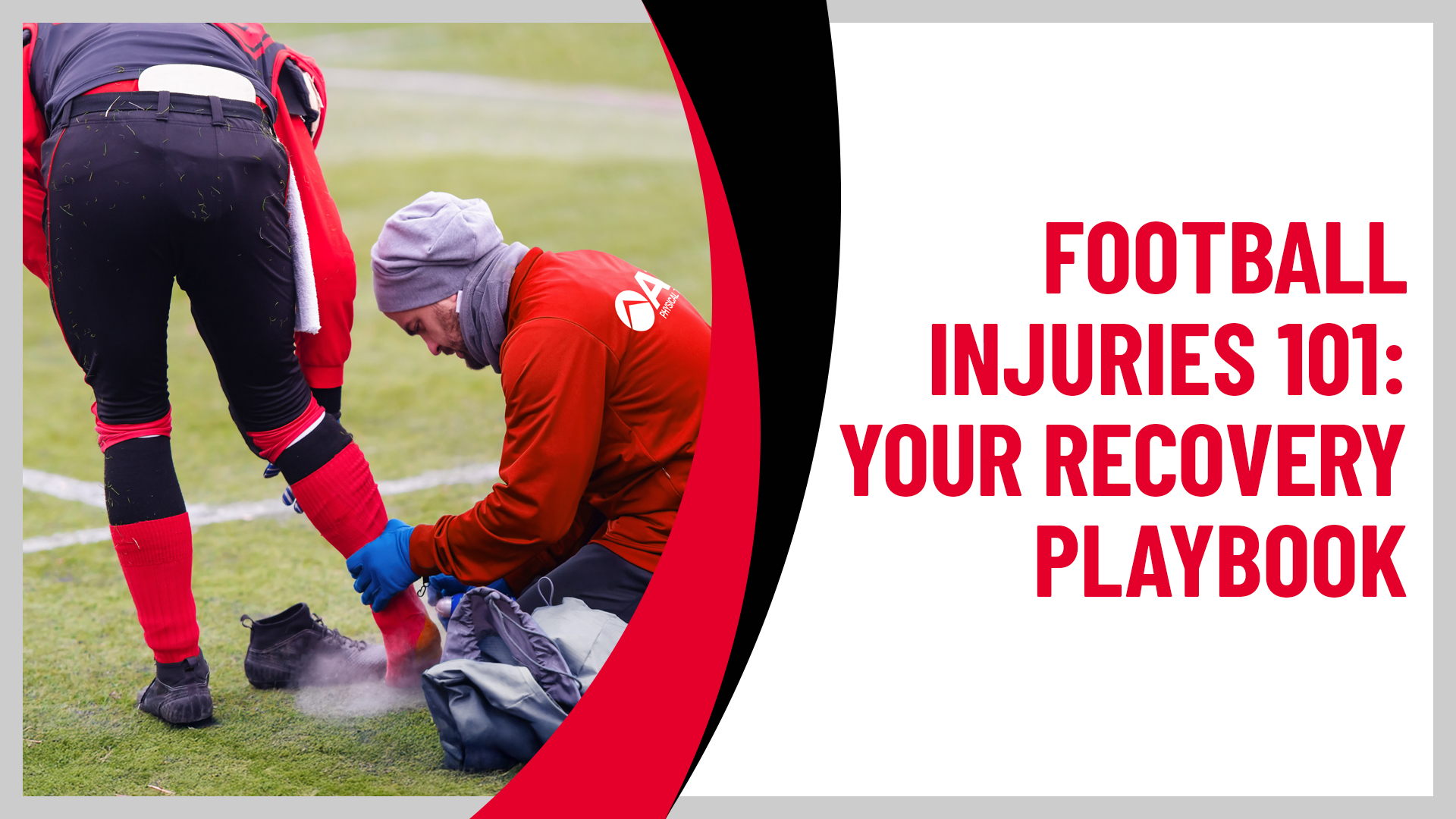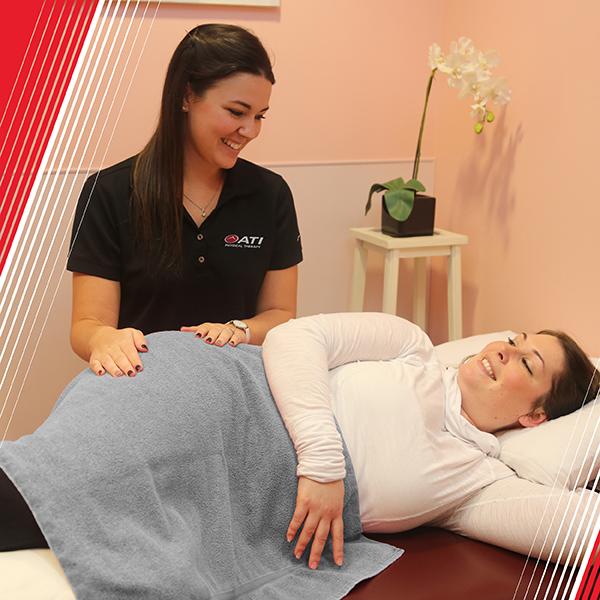Select a category:

Managing Sciatic Pain During the Holidays: Tips for a More Comfortable Season
Holiday travel, extra time on your feet, and long hours sitting during meals or gatherings can make sciatic nerve pain […]

Winter Back Pain: Why It Happens and How to Prevent It
Cold weather can make your back feel tighter, stiffer, and more prone to injury. Reduced activity, tense posture, and outdoor […]

Wrist Pain at Work: Ergonomic Fixes That Actually Help
Typing should not hurt. Wrist pain is one of the most common complaints among desk workers, especially as hours at […]

Knee Injuries Explained: ACL and Meniscus Tears
Twists, cuts, and awkward landings can strain the knee during sports and everyday life. The anterior cruciate ligament, or more […]

The Benefits of Physical Therapy: More Than Just Injury Recovery
Physical therapy is not only for post operation rehab or sports injuries. It supports everyday life, from walking the dog […]

Football Season Injury Guide: From Ankle Sprains to Turf Toe
Football season brings excitement, hard hits, and a steady stream of questions about injuries. This guide explains what the most […]

Online PT 101: How Virtual Therapy Works and Why Patients Love It
Virtual physical therapy delivers expert care through secure video visits and digital tools, so you can start and stay consistent […]

Prevent Falls at Home: Room by Room Safety Checklist
Small changes at home can make a big difference. Use this room-by-room checklist to lower your fall risk, feel more […]

ATI Physical Therapy Goes Private
ATI Physical Therapy Transitions from Public to Private Ownership Move to Private Ownership Supports Long-Term Growth, Operational Flexibility, and Continued […]

What to Look for in a Physical Therapist
Reviewed and contributions made by VP of Clinical Development Thomas Denninger Finding the right physical therapist (PT) is essential for […]

When to Try Physical Therapy Before Surgery
Reviewed and contributions made by VP of Clinical Development Thomas Denninger Surgery can be an essential medical intervention, but it […]

Stretch to Success: The Best Pre- and Post-Workout Stretches to Add to Your Routine
Do you have any fitness-focused New Year’s resolutions? Perhaps you want to run a marathon, complete your longest bike ride […]

Physical Therapy vs. Chiropractor: Which is Right for You?
Reviewed and contributions made by Sr Director Access Management Operations Dallas Reynolds, PT, DPT, Cert. DN, COMT There is no […]

ATI Physical Therapy Named One of Oregon’s Top Workplaces
This marks the clinic’s first-time recognition based on employee feedback and key cultural factors Bolingbrook, IL, September 29, 2024 – […]

Tips for Living With Chronic Back Pain
Reviewed and contributions made by Sr Director Access Management Operations Dallas Reynolds, PT, DPT, Cert. DN, COMT Living with chronic […]

Most Common Shoulder Injuries in Sports
Reviewed and contributions made by Sr Director Access Management Operations Dallas Reynolds, PT, DPT, Cert. DN, COMT Shoulder injuries are […]

Benefits of Physical Therapy for Dishoulders
Reviewed and contributions made by Dallas Reynolds PT, DPT, Cert. DN, COMT While shoulder dislocations are commonly known, they remain […]

Celebrating Physical Therapy Month
Every October, ATI recognizes and celebrates Physical Therapy Month. As a leader in the PT industry, we are proud of […]

When to Start Physical Therapy After ACL Surgery
Reviewed and contributions made by Sr Director Access Management Operations Dallas Reynolds PT, DPT, Cert. DN, COMT What is the […]

What To Look For In A Physical Therapist
Content reviewed and contributions made by Sr Director Access Management Operations Dallas Reynolds, PT, DPT, Cert. DN, COMT Finding the […]

The Benefits of Preventive PT
Reviewed and contributions made by Dallas Reynolds, PT, DPT, Cert. DN, COMT Like in many areas in health and medicine, […]

Backpack Safety: Start the School Year Off Right
Reviewed and contributions made by Dallas Reynolds, PT, DPT, Cert. DN, COMT The start of a new school year is […]

Causes and Effects of High School Sports Injuries
Content reviewed and contributions made by Beth Pierpoint, MSPT Sports are incredibly beneficial for children and adults. Sports teach teamwork, […]

Understanding Pelvic Floor Physical Therapy for Men
Reviewed and contributions made by Senior Director, Specialty Services Kari Melby, MPT In June, we celebrate Men’s Health Week. This […]

ATI Celebrates Hand Therapy Week
Reviewed and contributions made by Occupational Therapist Kevin Amarantos, OTR/L, C/PAM At ATI, we are proud to offer Hand Therapy […]

ATI Celebrates Women’s Health Week
Reviewed and contributions made by Senior Director Specialty Services Kari Melby May 14th kicks off Women’s Health Week. ATI joins […]

ATI Celebrates Occupational Therapy Month
Contributions by Marylynn Jacobs, MBA MS OTR/L CHT & Michele Auch, OTD, OTR/L, CHT April is Occupational Therapy Month. ATI […]

Core Exercises & Training
Reviewed and contributions made by Director Case Manager David Ensign When you hear the words “Core Muscles” do you picture […]

ATI Celebrates National Athletic Training Month
Reviewed and contributions made by Patty Sellner MA, AT, EIS, CWWS March kicks off the beginning of National Athletic Training […]

The Best Stretches for Hockey Players
Contributions made and reviewed by Monika Burrescia, PT, DPT Like all athletes, hockey players can benefit from a dynamic and […]

Top Tips for Exercise in Cold Weather
Reviewed and contributions made by Patrick Roscoe, MS, LAT, ATC; Zac Roberts, LAT, ATC; and Zach Zinzer, LAT, ATC. Just […]

Exercises in Physical Therapy for Lower Back Pain
Contributions made and content reviewed by Ari Kaplan, PT, DPT, SCS, CSCS, COMT, Cert MDT Low back pain is one […]

Does Virtual Physical Therapy Work? Yes!
What is the value of virtual therapy services? Physical Therapy is a cost-effective alternative to medication and surgery for joint […]

Stretch to Success in 2023: The Best Pre- and Post-Workout Stretches to Add to Your Routine
Do you have any fitness-focused New Year’s resolutions for 2023? Perhaps you want to run a marathon, complete your longest […]

Five Common Basketball Injuries
Reviewed and contributions made by Dallas Reynolds, PT, DPT, Cert. DN, COMT and Director of Operations Support – Central Scheduling/Virtual Services […]

Basketball Stretches for Ballers
Reviewed and contributions made by Dallas Reynolds, PT, DPT, Cert. DN, COMT and Director of Operations Support – Central Scheduling/Virtual […]

Holiday Eating: Tips for a Healthier Holiday
Reviewed and contributions made by Lisa Gleason, Registered Dietitian/Nutritionist So often the holidays come and go in a flurry of […]

How to Prevent Snowboarding Injuries
Reviewed and contributions made by Ari Kaplan, PT, DPT, SCS, CSCS, COMT, Cert MDT and Physical Therapist – Board Certified Sports […]

The Importance of Orthopedic Physical Therapy
Reviewed and contributions made by Jacqueline Davenport, PT, DPT, Board-Certified Clinical Specialist in Orthopedic Physical Therapy What is Orthopedic Physical […]

Why do kids walk on their toes?
Reviewed and contributions made by Anne Kender, PT, DPT, c/NDT and Pediatric Physical Therapist When a child learns to walk, […]
Simple Water & Swimming Pool Exercises
Reviewed and contributions made by MarQue’t Green, FIRST Program Director If you are looking to change up your workout (or […]

ATI celebrates National Physical Therapy Month
Content reviewed and contributions made by Dallas Reynolds, PT, DPT, Cert. DN, COMT Every October the American Physical Therapy Association […]

Improve Your Running Gait With ATI
Reviewed and contributions made by Caitlin Ludington, DPT, SCS There are a variety of common injuries that can plague a […]

Staying Hydrated: Cold Water vs. Lukewarm Water
Reviewed by Dallas Reynolds, PT, DPT, Cert. DN, COMT It’s generally known that people should drink about eight cups of […]

Common Boxing Injuries & How to Prevent Them
Reviewed by Jason Pequette, MS, ATC, CSCS Boxing has a long history. As a sport it has evolved through the […]

Calculating Your Target Heart Rate for Exercise
Reviewed and contributions made by Kendra Rorabaugh, Sr. Business Development Manager, MBA, BA, Kinesiology & Exercise Science We’ve all felt […]

Preparing for Fall Sports Training
Content reviewed by Tyler Nohren, MS, ATC; Patrick Roscoe, MS, LAT, ATC; and Adam Babiarz, DAT, LAT, ATC Fall sports […]

Tailbone Stretches to Relieve Coccyx Pain
Reviewed and contributions made by Kari Melby, MPT, Senior Director of Women’s Health Services Commonly referred to as the “tailbone”, […]

Indoor Cycling: Quick Fixes for Injury Prevention
Reviewed and contributions made by Bradley Eggebraaten, PT, BSPT, ATC, Board-Certified Clinical Specialist in Sports Physical Therapy (SCS) Indoor cycling […]

Neck Stretches & Physical Therapy Exercises For Neck Pain
Reviewed and contributions made by Joshua Holskey, PT, DPT, OCS, FAAOMPT, CSCS Neck pain will affect up to 70% of […]

Common Baseball Injuries and Prevention Tips
Reviewed and contributions made by Daniel Kline, DPT, SCS, ATC Baseball season is in full swing. While the most common […]

Understand & Prevent IT Band Syndrome
Reviewed and contributions made by Brandon Engle, PTA Running is well known for its health benefits – from improved cardiovascular […]

Occupational Therapy vs. Physical Therapy: Understanding the Difference
Reviewed and contributions made by MaryLynn Jacobs, MBA MS OTR/L CHT, Senior Director Hand Therapy Services, and Charles Thigpen PhD […]

Pediatric Physical Therapy: Care for our Precious Patients
Reviewed and contributions made by Carrie Becher, OTRL For all physical therapists, the goal is to help their patients improve […]

Understanding Functional Capacity Evaluations in a Worker’s Compensation Cases
Reviewed and contributions made by Michael Staley, MS, ATC, LAT, CWcHP When an injury occurs on the job, the recovery […]

June is Men’s Health Month
Reviewed and contributions made by Kari (Ziemba) Melby, MPT, Senior Director of Women’s Health Services June is Men’s Health Month. […]

ROTATOR CUFF SURGERY RECOVERY: PREPARING YOURSELF BEFORE AND AFTER SHOULDER REPAIR
Shoulder injuries are some of the most common injuries an adult can have. Athletes that put frequent stress on their […]

The Benefits of Physical Therapy for Headaches
Content reviewed and contributions made by Jaqueline Davenport, PT, DPT We’ve all had to deal with headaches throughout our lives. […]

Common Hiking Injuries: Prevention & Treatment
Content reviewed and contributions made by Brandon Engle, PTA Whether you are a novice or experienced hiker or backpacker, there […]

Five Lesser-Known Mental Health Benefits of Exercise
Reviewed and contributions made by Sarah Primeau, Certified USA Triathlon Coach, Yoga and STOTT Pilates instructor, & ATI Senior Sales […]

How to Prevent Swimmer’s Shoulder
Content reviewed and contributions made by Sarah Kate Peterson, PT, DPT, SCS Swimming is popular for many reasons. Both competitive […]

Correct Sleeping Positions: What is the Proper Way to Sleep?
By: Brian Rog and Todd Sayer, PT, MBA A good night’s rest should leave you energized and refreshed. But if […]

PLANTAR FASCIITIS PHYSICAL THERAPY TO REDUCE HEEL PAIN
Reviewed and contributions made by Diane Gordan, PT, DPT, OCS, CSCS Imagine that there’s a rubber band stretched across the […]

The Benefits of Physical Therapy for Balance
Reviewed and contributions made by Jeremy Rivada, PT Imagine this: you’re sitting in bed, having just woken up from a […]

Hydrotherapy: Aquatic Physical Therapy
Contributions by: Danielle Debulgado, Aquatic Therapist Have you been told its time to start physical therapy but don’t feel ready? […]

Your Pelvic Floor and You: Answers to Common Questions About Pelvic Floor Physical Therapy
Reviewed and contributions made by Kari (Ziemba) Melby, MPT, Senior Director of Women’s Health If you think of the pelvis […]

Pulled Groin Muscle Treatment Options and Symptoms
Athletes frequently suffer from groin strain or a torn ligament in the groin area. These muscle strains often occur during […]

Chronic Shoulder Pain Management: Understand & Treat Your Pain
Shoulder pain is, in many ways, an underrated issue in most people’s lives. We think about back pain or knee […]

Chronic Knee Pain: Causes, Impact, and the Therapy Option
When you are suffering from chronic knee pain, you begin to really understand what “chronic” means. More than almost any […]

Chronic Pain Management: How to Understand and Treat Your Chronic Pain
There’s a very strict definition of “chronic pain” that you can find in scientific papers and the works of international associations. […]

Put Yourself First! Self-Care Is Key
Staying Healthy Means Echoing the Advice We Give Patients Ryan Geary, PT, DPT, SCS, ATI Clinic Director in SC and […]

ATI Fit to Practice Podcast with Dr. Michael Crupain
Please tune in to ATI’s Fit to Practice podcast featuring Dr. Michael Crupain, MD, MPH, a senior vice president of […]

Get the Most from Your Health Insurance Before Year’s End | ATI
Get the Most from Your Health Insurance Before the End of the Year As another long year draws to a […]

National Physical Therapy Month
Celebrate National Physical Therapy Month! The month of October is dedicated to a topic we here at ATI celebrate every […]

Backpack Safety Isn’t Old School
As the school year begins to ramp up and the homework loads get heavier, so do backpacks. If students carry […]

SWIMMER’S SHOULDER TREATMENT SWIMMER’S SHOULDER EXERCISES & STRETCHES
With outdoor pools open for the summer, swimmers and exercise enthusiasts are hitting the swimming lanes. The benefits of swimming […]

Fall Sports Safety Tips
Preparing For the Fall Sports Season Fall sports season is just around the corner! While it may be tempting to […]

Treating Common Summer Sports Injuries
With summer well under way, outdoor sports are in full swing. From Little League tournaments to pick-up games of basketball, […]

Missy’s PT Career Growth
Joining ATI: Missy’s Inspiring Journey Missy Brass, Illinois District Director The Early Years In January 2011, ATI Physical Therapy […]

Growing Physical Therapy Practices
Joining ATI: A Great Decision Then and Now Fran Kosinski, SVP of Health Services If you are thinking about […]

Defining the Role of Physical Therapy
Building Awareness of the Benefits that Physical Therapy Provides Consumers Nate Bard, Chief Growth Officer As an industry, we have […]

Women’s Health Month
KICKING OFF NATIONAL WOMEN’S HEALTH WEEK IN MAY May is Women’s Health Month, a time dedicated to encouraging women to […]

A Look at ATI’s Future
NEW BEGINNINGS – FRESH PERSPECTIVES Labeed Diab, Chief Executive Officer Like me, I’m sure you’re glad to leave 2020 […]

Remolding the Traditional Physical Therapy Practice
Labeed Diab, Chief Executive Officer 2020, COVID-19 and the challenges faced by physical therapy practices At ATI, we began the […]
Physical Therapy vs. Physiotherapy
When it comes to healthcare, understanding the nuances between different treatments can be crucial for patients seeking the right care. […]

Heart Healthy Habits For Seniors
Young At Heart: Heart Healthy Habits For Seniors When it comes to the impact of age on the heart, there’s […]

Taking the Mound With ATI’s Baseball Injury Expert
Contributions by: Ellen Shanley, PhD, PT, OCS Baseball season is in full swing, and, like every year, the players’ health […]

Staying Safe Together: ATI’s Commitment to Patient and Clinician Safety
Ray Wahl, Chief Operating Officer Health and Safety, Our Top Priority At ATI, the health and safety of our team members […]

Building and Growing Our Presence in 2021
Building and Growing Our Presence in 2021: Putting PT at the Forefront for Patient Care Nate Bard, Chief Growth Officer […]

High School Athletic Training Programs
High School Athletic Strength & Conditioning Programs with ATI Physical Therapy High school sports are an annual tradition. The teams […]

PT is Possible from Anywhere
How Online PT Can Help Patients’ Recovery Journey Andrew Emerson was playing his usual game of pick-up basketball when he […]
Featured Body Part: Shoulder
The shoulder is a complex joint that is made up of three bones: the clavicle, scapula and humerus. It can […]

Finding Your Purpose Through PT Awareness Month
Several years ago, Aidan Young, a micro preemie born at 23 weeks was diagnosed with moderate spastic hemiplegia, a form […]

ATI Celebrates PT Day of Service with Service Event & Special Foundation Presentation
During this year’s National Student Conclave hosted by the American Physical Therapy Association (APTA), ATI along with the APTA and […]

The Traveler’s Guide to Physical Therapy Through ATI
It’s been said that with age comes great wisdom, but on the less attractive side of the coin lies the […]

ATI Puts the Wind Back in Grady Honeycutt’s Sails
There’s nothing more relaxing than gliding gracefully on the water, being carried by the waves with a full wind in […]
Understanding Injuries of the MCL in Hockey
Contributions by: Andrew Grahovec and Katie Christopherson, ATC To compete at the professional level in any sport requires the most athletic, […]
A Cure for What Ails Healthcare’s Benchmarking Ills?
By: Chris E. Stout, PhD In this time of rapidly evolving payer models—the Patient Protection and Affordable Care Act (PPACA, or […]
Finding Opportunity in Giving Back
Authored by: Desirae Tinsley When I chose to volunteer for the ATI Global Reach program, my goal was to help as […]
Healthy Traveling Makes for Happy Travelers
Contributions by: Julianne Lessard OTR/L,CHT Air travel these days can be extremely taxing on the mind, body and soul, […]
Preserving the Art of Giving in Guatemala
By: Erin Doyle Growing up, I was taught one simple yet important lesson, which was to put others before yourself. […]
Embracing a Passion Through the Art of Giving
By: Hank Havlin When I first saw the email from ATI to participate in the Global Reach international service trip, […]
Healthy Holiday Food Swaps
Contributions by: Emily Fish, RDN, CD The aim for healthy eating around the holidays can often times be deviated off […]
Technology Trends in Healthcare and Medicine: Will 2019 Be Different?
By: Chris E. Stout, PhD This is a fitting time of year to pause and take a moment to look back […]
A Holiday Shopper’s Guide to Staying Injury-Free
Contributed by: Chris Chalko PT, DPT, COMT, OCS It’s the most wonderful time of the year – and possibly one […]
Discovering a New Meaning Through Giving Back
By: Matthew Pitton I recently had the opportunity to travel to Zacapa, Guatemala with a group of four ATI employees […]
Former Police Officer Overcomes Debilitating Effects of Stroke Through Physical Therapy with ATI
Contributions by: Abby Persicketti Looking to our past, we can all agree that there are days in which we can […]
Most Common Ice Hockey Injuries and Prevention
By: Brian Rog and Katie Christopherson, ATC Behind any sport’s glory lies a complex algorithm so delicate that even the […]
The Art of Rehabilitation in Underserved Communities in Guatemala
By April Venzon As I was browsing through my ATI email, I saw the notice for the final week to apply […]
From Sudden Cardiac Arrest Survivor to Advocate for the Cause
As we navigate through life, we are continually faced with the painful reality that misfortune can strike anyone, at any […]
Making a Difference in the San Pedro Sacatepéquez Community
Written By: Sam Rate, PT It’s challenging to put into words the level of sentiment and respect that’s achieved after […]
ATI’s Niah Fulford Reflects On Her Guatemala Mission Trip with the Global Reach Team
When I signed up for the ATI Global Reach program in San Pedro Sacatapéquez, Guatemala, I had little knowledge of […]
New Name. Same Mission.
Since its inception, ATI’s global outreach program, originally tabbed as ATI Mission Works, has provided medical care to communities around […]
So Much Good in Such Little Time
During our time in San Pedro Sacatepéquez and Villa Nueva, Guatemala, the reality of how one small action can accumulate […]
Cultivating Hope from One World to Another
By: Alysia Isong, PT, DPT When I received the news that I would be joining ATI’s Global Reach efforts in […]
Stretches for Your Next Road Trip Adventure
There it is again, that nagging pain in your lower back after a full day of driving. You’ve tried everything […]
The Ride of a Lifetime – Overcoming a PCL Tear
The road to recovery is never without its own slew of setbacks and can often times be afflicted with challenges […]
ATI Foundation Goes 3 for 3
As the saying goes, everything comes in threes, which was certainly the case for the ATI Foundation who recently hosted THREE presentations […]
ATI’s Haley Boyd Recognized by Mayor and City Council
On August 14, ATI Physical Therapy athletic trainer Haley Boyd from our Oxford, Ala., clinic received special recognition from the […]
ATI Physical Therapy Helps Child with Cerebral Palsy Take First Steps
In trying to keep life centered, at some point along the way we all face challenges that throw us off […]
When Your Infant Refuses to Eat, Feeding Aversion May Be to Blame
Contributions by: Carrie Becher, Pediatric Occupational Therapist, OTRL from the ATI Grand Blanc, Mich., clinic When it comes to food, we all have […]
ATI’s Lindsay Fons Leads the Charge in Combatting Health Disparities for the LGBT Community
At ATI, we like to think that the day’s challenges provide us with our guiding sense of character and purpose. […]
ATI’s Kari Ziemba Receives Pelvic Health Instructor of the Year Award
Earlier this year, Jenn Davia, PT, DPT, Director of Education at Section on Women’s Health-APTA (SoWH), presented the 2018 Outstanding […]
The Benefits of Physical Therapy for Stroke Patients
By: Denise Lovorn, PT, DPT, CSRS We all might have heard of the signs and symptoms; facial numbness, arm weakness, […]
Transform Your Health Through Running
By: Hannah Fox, PT, DPT, SCS, ATC Sitting has been termed the new smoking. Think about all the time spent […]
Giving Gratitude a New Meaning
By: Lee Hahn As I look back on my experience in Guatemala with ATI Global Reach and Hearts in Motion, […]
One Story, One Great Outcome — How One Patient Overcame Two Tibial Fractures
Every patient has a story. Whether they’ve suffered a sports injury during competition or had a fall in their home, […]
Avoiding Aches and Pains when Raking the Leaves this Fall
By: Brian Rog and Kurt Gengenbacher, PT, DPT, OCS, SCS, CSCS As the cooler temps and shorter days blanket the nation, […]
Tips for a Healthy Post-Marathon Recovery
By: Brian Rog and Doug Adams (PT, DPT, SCS, OCS, CSCS) In just a few short days, the streets of […]
ATI’s Darla Gipson Takes on the Firefighter Challenge
On September 9th, the Anderson, Indiana Fire Department invited ATI’s Darla Gipson from our Anderson, Ind., clinic and eight others […]
Sport Related Concussions Risks Prevention and Treatment
By: Ellen Shanley, PhD, PT, OCS Sport-related concussions are a concern for athletes of all ages, but especially for youth […]
Knuckle Cracking and Hand Osteoarthritis: Your Questions, Answered
By: MaryLynn Jacobs, MA, OTR/L, CHT If you’re like many, cracking your knuckles can become a habit and lead you […]
ATI Finishes Strong at ISC Corporate Challenge in Indianapolis
ATI was well represented at this year’s ISC Corporate Challenge in Indianapolis, rounding out the podium 3rd overall out of […]
Celebrating Hand Therapy Week
Contributions by: MaryLynn Jacobs, MA, OTR/L, CHT During the first full week of June, ATI Physical Therapy, the American Society […]
Tips to Avoid the Cold and Flu
By: Beth Brown, MBA, MSN, RN, CEIS™, COHC, COHN-S, Occupational Health Nurse/Lead Registered Nurse While colds and flu viruses can happen […]
A New Way of Life for the Less Fortunate
By: Michelle Davis As I reflect on my recent service trip to Zacapa, Guatemala, I feel unbelievably blessed to have had […]
Playing it Safe on Halloween with Trick-or-Treating Safety Tips from ATI Physical Therapy
By: Brian Rog and Kurt Gengenbacher, PT, DPT, OCS, SCS, CSCS From the loads of candy to the extravagant costumes, […]
Going Back to Guatemala
By: Brent Panno In my recent medical service trip this year, I joined ATI Global Reach and Hearts in Motion […]
Featured Body Part: Core
Your ‘core’ is a complex series of muscles, extending far beyond your abs, including everything besides your arms and legs. […]
ATI’s Nathan Mansell Heads to the U-20 FIFA World Cup
This past May, ATI Physical Therapy’s Nathan Mansell, PT, DPT, ATC, traveled to Poland to cover the U-20 United States […]
A New Type of Balance Board Aimed at Peak Performance
We mean it when we say “our team leads the way in pioneering the future of the industry”. Such is […]
Yoga or Physical Therapy: Is Yoga a Competitor to PT?
By: Marge Taylor, PT, PhD The modern Western world has embraced the ancient Indian practice of yoga in the quest […]
Keep Your Hands Safe While Swiping, Texting and Gaming
By Stephanie Levinson and Julianne Lessard OTR/L, CHT Handheld technology is constantly changing, but our bodies can’t evolve nearly as […]
Dry Needling and Physical Therapy: What’s the Point?
ontributions by: Andrew Grahovec and Megan Teeters, PT, DPT Pain and tightness is a common ailment that many people suffer […]
ATI Worksite Solutions: Disrupting the Paradigm of Traditional Occupational Medicine
In today’s ultra-competitive marketplace, there is no down time and many businesses must operate at peak levels to keep up […]
Pain Management Techniques Without Medication
ontributions by: Andrew Grahovec and Janet Hustak, PTA With hundreds of experts deployed across our national footprint, every day our […]
Hitting the Slopes? Consider these Expert Recommended Safety Tips
By: Brian Rog and Laura Waller, ATC, LAT Gasping that brisk winter air as your snowboard seamlessly rips through that […]
Vestibular Disorders and Dizziness: Symptoms, Causes and Treatments
Contributions by: Andrew Grahovec and Emily Moore, PT, DPT, CCVT Have you ever felt like the world was moving around […]
Burn Awareness and Injury Prevention
Story originally published by ATI Worksite Solutions. Did you know that every minute someone in the US sustains a burn injury […]
Klimb4Kids Honorary Ambassador Update
As we continue the Klimb4Kids Campaign, we wanted to share a few stories about some of the honorary ambassadors we […]
From Construction to a Community
By Stephanie L. Irwin, PT, DPT, OCS Last May ATI Mission Works journeyed with 17 other volunteers with Move Together to build a […]
Snow Skiing as a Natural Anti-Aging Remedy
Contributions by: Peter Braun MS, LAT, ATC, ITAT The effects of time on one’s body are unavoidable and often substantial. […]
Featured Body Part: Jaw
The lower jawbone or mandible is the strongest bone in the human skull, allowing a human to exert a surprising […]
Techniques for Healthy Gardening
By: Brian Rog & MaryLynn Jacobs (MS OTR/L CHT) With the warmer temps settling in, many of us see this […]
Safety Tips to Avoiding Fireworks-Related Injuries this Fourth of July
The fridge is stocked, charcoal on the grill and fireworks in queue, but there’s one thing thousands of Fourth of […]
Consume Calcium or Else!
By Grace Wang and Chris E. Stout, PhD Much of the Western world is interested in health insofar as it […]
Is a strain, sprain, ache or pain getting in the way of your daily routine? It’s time to take action.
Unfortunately, 25.3 million American adults suffer from daily pain, and only 60% do something about it. Schedule a complimentary screening […]
Guatemala Reflections from Christina Lombardi
Mother Teresa once said, “Let no one ever come to you without leaving happier.” I have always strived to live […]
Lighten the Load on your Body with Backpack Safety Tips from ATI Physical Therapy
By: Brian Rog and John Duncombe PT, DPT, OCS, CIMT, CSCS, GCS Considering the practicality and convenience offered through our […]
Best Stretches for your Golf Game by ATI Physical Therapy
By: Brian Rog, Eric Buck MBA, ATC and Tyler Nohren, MS, ATC How often do we find ourselves full-throttling it […]
Guatemala Reflections from Cari Muzzy
As I think back on my Guatemala experience I primarily remember all of the amazing people I met. I think […]
Youth Football Concussion Prevention Program Shows Early Signs of Success
As the play clock winds down, your team takes formation and the center snaps the ball. That unmistakable sound of […]
An Analysis of ATI Physical Therapy’s Senior Patient
To better identify and educate patients and physicians on trends within specific patient populations, researchers at ATI Physical Therapy have […]
Catching up with U.S. Olympian Abbey D’Agostino and her Road to Recovery through ATI Physical Therapy
Training a lifetime for the opportunity to represent your country in front of millions on the international stage is something […]
How Physical Therapy is Helping to Fight the Opioid Crisis
For decades, long-term chronic pain management was widely believed to be controlled through opioids, such as Hydrocodone, Methadone and Oxycodone; […]
Guatemala Reflections from Stephanie Irwin
Moving Together… What an honor to have the opportunity to serve with ATI Mission Works and Move Together, Inc earlier […]
Featured Body Part: IT Band
The iliotibial band (ITB) is a broad and thick tissue that runs along the outside of the thigh. It is […]
National Physical Therapy Month as a Time for Awareness and Action
Helping others arguably represents the heart of who we are. While there may only be one day a year devoted […]
The Ergonomically Correct Home Office
By Grace Wang and Dr. Chris E. Stout Whether or not you realize it, you probably have a home office. […]
National Wise Health Consumer Month
By BobbieJo Paul, FNP, Provider/Health Coach, ATI Active Care Wise Health Consumer Month…what exactly is a wise health consumer? Let’s […]
Avoid Injuries while Shoveling Snow
Every winter, those of us in the states that tend to get snow wonder whether we’re going to get a […]
What is Sports Medicine?
By Matt Nohren, Outreach Athletic Trainer Although the origins of sports medicine can be dated back to the Roman Colosseum […]
Dwyane Wade’s Elbow Fracture Sidelines Him for the Season
Written by Mary Anne Dykstra, OTR/L, CHT Fractures to the elbow are quite common and usually occur due to a […]
March is National Nutrition Month
Have you ever thought about seeing a Registered Dietitian? The American Dietetic Association lists the top ten reasons why consulting with […]
What is Occupational Therapy?
By Chanon Vallas MS, OTR/L, CHT April is marked to celebrate the profession of occupational therapy and the impact it has […]
Sunglasses – Not Just a Fashion Accessory
By Ginger Dayton, Director of Health and Safety at ATI Worksite Solutions Almost everyone loves a bright and sunny day, but […]
The Role of Licensure for Athletic Trainers
By Katie Varnado, ATC, Midwest Director of Sports Medicine Athletic training licensure plays an important role in sports safety and […]
ATI Partners with Washington Youth Soccer Association
By Dennis Haupt You may not have noticed, but since December 2016 Washington Youth Soccer has provided ATI athletic trainers […]
Acts of Service: Returning to Guatemala
By Stephanie Irwin, PT, DPT Lech Walesa stated, “The thing that lies at the foundation of positive change, the way I see […]
Vacation Debilitation: Leisure Sickness and How to Avoid It
By Grace Wang and Dr. Chris E. Stout How many holiday meals have you had to skip because you were […]
Sitting Ourselves to Death
By Grace Wang and Dr. Chris E. Stout Whether we’re driving, sitting at our desks, or reclining in front of […]
Why Can’t I Have an Antibiotic?
By BobbieJo Paul, FNP, Provider/Health Coach, ATI Active Care Getting sick is a common part of life, but how many […]
Concussion Facts and FAQ
When you think about a concussion, what is the first thing that comes to mind? For many, it’s football. We think […]
Hectic but Healthy: How to Flourish in the Busiest Times of Your Life
By Grace Wang and Dr. Chris E. Stout What do you suppose is the number one excuse for not exercising? […]
What a Pain in the Back
By Grace Wang and Dr. Chris E. Stout According to Mayo Clinic, back pain is “one of the most common […]
Try PT First!
Did You Know . . . A 2017 study by ATI Physical Therapy, My Health First Network, BCBS and Greenville […]
Dealing with Anxiety
By BobbieJo Paul, FNP, Provider/Health Coach, ATI Active Care Sweaty palms, racing heart, dry mouth…the experience passes and you are […]
Avoid the Flu like the Plague
By Grace Wang and Dr. Chris E. Stout According to the United States’ Centers for Disease Control and Prevention (CDC), we […]
National Handwashing Awareness Week, December 7-13
By BobbieJo Paul, FNP, Provider/Health Coach, ATI Active Care Next week, December 7-13, is National Handwashing Awareness Week. While handwashing […]
Don’t Forget to Get Your Flu Shot
By BobbieJo Paul, FNP, Provider/Health Coach, ATI Active Care Every year we see advertisements telling us to get a flu […]
Lying ChEats: Foods You Thought Were Healthy That Aren’t
By Grace Wang and Dr. Chris E. Stout If you’ve been inside a grocery store lately, chances are you’ve been […]
It’s Not the Flu?
By BobbieJo Paul, FNP, Provider/Health Coach, ATI Active Care You’re not feeling good – nausea, diarrhea, a fever. You got […]
SNOW: Be in the Know to Avoid Injury
There’s a frigid four-letter word many don’t like to hear this time of year – SNOW! We have no way […]
Can You Ever Catch Up on Sleep?
We’ve all been there at some point. It’s that point of exhaustion where our body just feels like it’s running […]
How Cold is Too Cold to Exercise Outside?
You lace up your shoes, pile on all the appropriate clothing layers, and head outside only to find that it […]
Is It Thirst or Hunger?
Have you ever been sitting around and suddenly felt hungry? You pull out some snacks and munch away only to […]
National Kidney Month
There are two small organs that are often not thought about when considering health. The kidneys are a pair of […]
GPS Watches Valuable in Identifying and Correcting Running Dynamics
Device is like having a running lab on your wrist A recent ATI Physical Therapy study found that GPS running […]
Sleep and Your Health
Authored by BobbieJo Paul, FNP, Provider / Health Coach, Activate Healthcare Are you thinking about how you’re making healthy choices? Did you know […]
Prepare for Summer Fun Safely
By BobbieJo Paul, FNP, Provider/Health Coach, ATI Active Care Warmer weather means more outdoor activities. As we shed the jackets […]
Plyometric Training
The off-season is the ideal time to build explosive power. Plyometrics are high-velocity dynamic exercises that force muscles to lengthen […]
Guatemala Reflections from Lynette Carlson
Since the inception of ATI MissionWorks, I’ve wanted to go on a trip with Efosa. Last month it finally came […]
Your Sports Physical Questions Answered
Authored by BobbieJo Paul, FNP, Provider/Health Coach, Activate Healthcare What is a sports physical? A sports physical or sport clearance exam is […]
The Importance of Multiplanar Training
The activities of running, swimming, and to a lesser extent, cycling all require some amount of movement and control in […]
Bug Bites: Treatment and Prevention
By BobbieJo Paul, FNP, Provider/Health Coach, ATI Active Care Mosquitos, spiders, ticks and bees are here. The great outdoors can […]
Guatemala Reflections from Brent Panno
We had just finished a day of treating patients, and were at the home of friends of the foundation we […]
4 Ways to Avoid Gym Germs
Whether New Year’s Resolutions or the cold weather outside are the cause, the beginning of the year brings a crowd […]
5 Ways to Make Your New Year’s Resolution Stick
With January 1st behind us, our New Year’s Resolutions are in full swing. How is your resolution going? We all start […]
Need Ideas for a New Year’s Resolution? Try These!
The New Year is here which means it’s time to make those resolutions. Sure, maybe we made some resolutions last […]
5 Ways to Stay Fit through the Holidays
With the holidays in full swing, working out may be taking a backseat to everything else. It’s hard to fit […]
Poor Posture Affects You More Than You Know
At some point while we were growing up many of us probably heard our parents or teachers say, “Sit up […]
How Long Does It Take to Get out of Shape?
The holidays are here and with all of the shopping, family and friend gatherings and everything else, your workouts have […]
6 Ways to Combat Holiday Stress
The holidays are in full swing which means stress is either already here or on its way. From the parties to the […]
How to Dress for Winter Workouts
You check the temperature before heading out for your run: 29 degrees with a wind chill of 22. Brrr! You […]
Talking Turkey
Family, food and festivities…the ingredients for great Thanksgiving memories! But, if you’re not careful, these memories may turn into aches […]
Did You Know It’s a Gross World? Wash Your Hands.
Hand Washing: we all do it, sometimes. Did you know that hand washing has a very important role in your […]
Out of Breath After Climbing the Stairs? Here’s Why
You’ve just climbed a flight of stairs…just one…and you’re out of breath. As you continue to walk down the hall, […]
Pancreatic Cancer Awareness Month
Authored by: BobbieJo Paul, FNP, ATI Active Care As we leave the month of October, we’ll be seeing a change […]
Should You Be Sitting on a Core Ball Right Now?
Core balls–also known as physio balls, exercise balls, or yoga balls– seem to be everywhere lately. What was once just […]
Time for the Flu Shot
By: BobbieJo Paul, FNP, ATI Active Care It’s that time of the year again, and we’re all seeing advertisements and […]
Strength Training: We All Need It
When you hear the words ‘strength training,’ what comes to mind? Is it body building, bicep muscles as big as […]
Morning or Night: When Is the Best Time to Work Out?
Whether you’re a seasoned exerciser or just starting out, the question about the best time to work out has probably […]
Could Walking Be the Best Form of Exercise?
In our journey to get healthy, the majority of us have probably tried multiple types of exercises in an attempt […]
Summertime Heat and Safety
Summer is here and so is the heat. While flu season is behind us, there are still health concerns in […]
Is Housework Considered Exercise?
The clock just struck noon and you’ve officially been cleaning your house for 4 hours now. You’re sweaty and tired […]
Sleep vs. Exercise…Which Should You Choose?
You’ve set your goals, committed to your workout plan and started improving your diet. This time, more so than any […]
Pain in the Hand? Hand Therapy May Help
ATI celebrates Hand Therapy Week—discusses common hand ailments and treatments We use our hands everyday, and for every little thing. […]
Tips to Stay Motivated during Your Fitness Journey
Whether we’re seasoned exercisers or just starting out, motivation – or lack thereof – has probably crossed our minds at […]
Asthma and Allergy Awareness
Runny nose, congestion, sore throat, cough or wheezing? At what point should you become concerned? These symptoms can become recurrent, but […]
April Is National Alcohol Awareness Month
“Would you like to order a drink with that?” If you are over the age of 21, you have likely […]
March 15-21 Is National Poison Prevention Week
We often think of our home as a safe place. However, common items such as cleaning chemicals, medications and plants […]
Love Your Heart
Heart disease is the leading cause of death in both men and women. In fact, according to the CDC, about […]
Healthy Weight Week January 18 – 24
This time of year, many people choose to make a New Year’s resolution to lose weight and become healthier. Unfortunately, […]
Deck the Halls Injury Free
Tips to help prevent holiday decorating injuries Between getting boxes out of the attic, hanging those twinkling lights, and hauling the […]
November is American Diabetes Month
By BobbieJo Paul, Family Nurse Practitioner, ATI Active Care, Waukesha, Wisconsin Diabetes is a chronic disease that can cause serious […]
Diabetes Awareness
Diabetes is a chronic disease that can cause serious health complications and death. According to the Centers for Disease Control […]
Seasonal Influenza: Beat the Bug!
The time is NOW to protect yourself from the flu By BobbieJo Paul, Family Nurse Practitioner, ATI Active Care The […]
October is Breast Cancer Awareness Month
By BobbieJo Paul, FNP, Provider/Health Coach, ATI Active Care October is the month when you will start to see pink […]
Concussion: When Do I Pull My Athlete?
Concussions continue to be a hot topic on the sidelines and in the news, especially now that we are in […]
Autumn Clean-Up Tips
As much we don’t want to admit that summertime is almost over, the chilly nights and changing leaves are a […]
What is Enterovirus D68?
By BobbieJo Paul, Family Nurse Practitioner, ATI Active Care, Waukesha, Wisconsin While many think of the flu season as a time […]
ATI Celebrates World Physical Therapy Day
“World Physical Therapy Day is an opportunity for physical therapists from all over the world to raise awareness about the crucial […]
September is National Cholesterol Education Awareness Month
By BobbieJo Paul, Family Nurse Practitioner, ATI Active Care, Waukesha, Wisconsin According to the Centers for Disease Control and Prevention (CDC), […]
“Live (Pain) Free, Ride Hard” – Tips for Motorcycle Riders
When you see motorcycle riders on the road, you may not think that leisurely cruising in the countryside may cause pain […]
Katie: ATI’s Decorated Special Olympian
Following a devastating injury in November 2013, 52-year-old Katie Lovell of Morris, Illinois feared that her dream of competing in […]
August is National Immunization Awareness Month
Immunizations have helped many people avoid becoming sick with diseases that have caused significant illness, disability and death. However, many […]
Understanding Tennis and Golfer’s Elbow
If you’re on the court, or at the greens, you may hear the terms “tennis elbow” or “golfer’s elbow.” However, […]
ATI Offers Tips for a Safe 4th of July!
When you think of injuries and the 4th of July, it’s pretty safe to say that “Fireworks” pop to mind […]
Exercise Safety Tips for the Warm Weather
The “Lazy, Hazy, Crazy Days of Summer” are here! Between hot temps, a fiery sun and high humidity, outdoor exercise […]
Don and ATI: Their Road to Success!
There’s not much that can keep Don Esbjornson down. Not a degenerative disc disease, a back surgery 12 years ago […]
Gua sha, an ancient treatment with modern relevance
At first glance, Gua sha treatment looks like it would be painful, but it is actually healing. This traditional East […]
ATI is Glad to be a Part of Dwayne’s World
Do you know Dwayne Oblender Myers? If you don’t, all you need to do is check out the ATI Physical Therapy […]
Dynamic Running Stretches Before a Race
Race season is in full swing. If you are signed up for a race, you’ll want to make sure you […]
Navy Sailor Gets His Sea Legs Back
Patrick Boettger is on active duty with the United States Navy in the country of Behrain. While on a run […]
ATI Patient Determined to Serve
Soldier With a Strong Will Overcomes a Physical Weakness Twenty-year-old Austin Findley has always dreamed of being in the military. […]
Exercises for Advanced Runners
Experienced runners…are you getting tired of your exercise routine? Patrick Manrique, a physical therapist at ATI’s Chicago South Loop clinic demonstrates some […]
3 Stretches for Plantar Fasciitis
Have you gone out for run, but felt pain in your heel when you woke up? The pain you are […]
Mommy Thumb Treatment Options and Symptoms
Authored by Eileen Scanlon, Hand Therapist with ATI Physical Therapy in West Dover, DE. Being a new mother is a special […]
ACL Tears and Knee Pain More Common for Women with Activity
Authored by Jessica Keiser, PT, DPT, CSCS with ATI Physical Therapy in Milwaukee Third Ward, WI. Did you know that […]
Exercises for Beginner Runners
Thinking of tackling a 5K this summer? Before you put one foot in front of the other, you should prepare […]
Spring into Seasonal Cleaning Without Injuries
By: Michelle L. Quillin, MPT, Regional Director (Willowbrook, Darien, Countryside, LaGrange, Broadview) With the warmer weather and longer days, it’s a perfect time to […]
Olympic Runner Gets Head Start with ATI
When you’re an Olympic runnner, milliseconds can make the difference between bringing home a medal, or leaving empty handed. Though […]
Avoid Pain at Your Desk: Quick Tips on Office Ergonomics
Sitting at a desk from 9-to-5 wouldn’t be the reason for any kind of physical pain… would it? If you’ve […]
Getting Ready for Warm Weather Activity: Steps to Help Avoid Injury
Now that Old Man Winter has finally loosened his grips, we are all definitely looking forward to spring! For many, […]
Protect Yourself from Vector-Borne Diseases
By BobbieJo Paul, Family Nurse Practitioner, ATI Active Care, Waukesha, WI As the title suggests, World Health Day is a day […]
This Soccer Player Had More Than One Goal in Mind
Javier Rojo of Elgin, IL has been playing soccer since the age of seven. A collegiate player at Judson University, […]
Reduce Your Colon Cancer Risk
By BobbieJo Paul, Family Nurse Practitioner, ATI Active Care, Waukesha, Wisconsin Colorectal cancer is the third most common cancer diagnosis in […]
5 Questions All Injured Workers Should Know the Answer To
By Chad Koch, ATC, CSCS, F.I.R.S.T.™ Program Director, Bourbonnais, Illinois Often times, overcoming a work injury can be harder mentally than […]
Join ATI in the Fight Against Opioid Abuse
Contributions by: Walt Lingerfelt, PT, DPT With the growing need for treatment to relieve lower back pain or other nagging […]
Taking Advantage of Stress: How It Could Help Your Health
By: Amanda Clark, PT, DPT, SCS Do you have a negative perception of stress? Do you think of it as […]
Working Through the Pain, Getting Back to Life With ATI
The moment you step foot in the door of an ATI Physical Therapy clinic, the difference in service can be […]
ATI Celebrates Occupational Therapy Month
Contributions by District Director James O’Shea, OTR/L, MOT, CHT April is Occupational Therapy Month. ATI joins the American Occupational Therapy […]
“No pain, no gain” not the motto for weekend warriors
After miles of running, biking, and swimming, many weekend warriors hold fast to the old adage “no pain, no gain.” […]
An Athletic Trainer’s Role in Helping Prevent, Assess and Care for a Concussed Athlete
The role a certified athletic trainer (ATC) plays in preventing, assessing and caring for a concussed athlete is critical to […]
ATI Foundation’s Washington Golf Outing Honors Local Beneficiary
Nine-year-old Taylor of Puyallup, Wash., was diagnosed with cerebral palsy at the age of two. She’s been in speech and […]
How to Eliminate Stress: 8 Tips From the Experts
Contributions by: Shelly Najjar, MPH, RDN Feeling overwhelmed, frantic or rushed? Can’t seem to get a break? Working on that […]
Getting Smart About Superfoods
By: Shelly Najjar, MPH, RDN, CD The term “superfood” is commonly used to mean a food reported to provide health […]
Pregnancy and Nutrition: What You Should Be Eating
By: Rebecca Crecente, PT, DPT, SCS Every life is special, and in this life we have the capability to create […]
Obesity in America: How Much Is It Costing You?
By: Maggie O’Brien, PT, DPT Obesity is defined as a Body Mass Index (BMI) of 30.0 or greater, or roughly […]
Fresh or Frozen – What’s Best for Your Health?
Contributions by: Emily Fish, RDN, CD After a long day of work, cooking dinner may seem like a chore at […]
Keeping Active in the New Year
By: Briana Jamshidi, Rehab Technician After a long week of work, countless errands and running around, the weekends may be […]
When to Use Ice or Heat
It’s been a crazy day! Just as you check one thing off the to-do list, it seems like two more […]
Adaptive Bicycle Presentation
A.J. Hawk Commercial
Aleena Bhatty
Aleena Niaz, age 5 Bloomingdale, IL After suffering maternal trauma, Aleena is affected with Hypoxic Ischemic Encephalopathy (HIE), a brain […]
ATI in Chicago
Looking for a change of scenery? Check out the benefits to working at ATI in Chicago.
ATI in Indiana
ATI in Las Vegas
ATI in Naperville
ATI Patient Story: Jake and Tyler
ATI Patient Story: Kathy Groves
Complimentary Injury Screenings
Devin Hester Pro Camp
Dwight Freeney Pro Camp
Exercises for After a Knee Replacement
Knee Replacement Rehab Physical Therapist JC Sales, of ATI Physical Therapy in Woodridge, IL, demonstrates four useful exercises that can […]
What to Expect as a Patient at ATI
This video will help walk you through what its like walking into ATI for the first time.
National Handwashing Awareness Week, December 7-13
By BobbieJo Paul, FNP, Provider/Health Coach, ATI Active Care Next week, December 7-13, is National Handwashing Awareness Week. While handwashing […]
October is Breast Cancer Awareness Month
By BobbieJo Paul, FNP, Provider/Health Coach, ATI Active Care October is the month when you will start to see pink […]
When to Try Physical Therapy Before Surgery
Reviewed and contributions made by Sr Director Access Management Operations Dallas Reynolds, PT, DPT, Cert. DN, COMT The decision between […]
How to Relieve Chronic Pain
Are you dealing with Chronic Pain? You’re not alone. Chronic pain impacts approximately 20 percent of Americans, resulting in restricted mobility, opioid […]
Experiencing Pelvic Pain?
So, you have pelvic pain… A quick Google search on pelvic pain will yield such medical terms as vulvodynia, endometriosis, […]
Sitting Too Much? No Time to Exercise? Try Deskercise!
How much do you sit during a typical day? Let’s add it up! According to the Population Reference Bureau, the average […]
Seven Key Benefits of Physical Therapy
The Many Benefits of Physical Therapy Unless you’ve attended physical therapy in the past, it’s probably safe to say that […]
Simple Stretches While Working from Home
We can all agree that exercising and stretching are essential to maintaining a healthy, well-balanced lifestyle. But for many Americans, […]
Cardio or Strength: Which Comes First?
You have your exercise plan for the day ready to go. You’re going to a 45 minute spin class and […]
Top Tips For Exercising in the Cold
The arrival of the winter months doesn’t mean that outdoor activities should be abandoned. Whether you’re an athlete, an outdoor […]
Wellness Tips for Winter Aches and Pains & Common Winter Injuries
Wellness Tips for Winter Aches, Pains & Sprains Wintertime can mean many different things, depending on where you live. Perhaps, […]
Winter Safety for Seniors: How Physical Therapy Can Help You Conquer Cold
How Does Cold Weather Affect the Elderly? As the temperatures in certain areas of the country drop, the risk of injury […]
How to Stay In Shape Indoors — A Beginner’s Home Workout Plan
HOW TO STAY IN SHAPE INDOORS: A BEGINNER’S HOME WORKOUT PLAN Has it been a while since your last workout? […]
How to Improve Physical Health
Most of us are familiar with the popular phrase, “New Year, New You!” Coming off of what was a trying […]
Soccer Stretches to Incorporate into your Pre-game Warm-up
By: Brian Rog and Jen Robbins, MS, ATC We all aim to be that bigger, faster and more conditioned athlete […]
Get Back To Your Best With A Free 15-Minute Consultation
Get Back to Your Best with a Free Consultation Are you an adult living with pain? If so, you’re not […]
Regaining Independence After Limb Loss: A Patient’s Journey of Learning to Walk Again
In 2012, Bree Jones graduated from college with a degree in criminal justice. She was excited to start her career, […]
How Physical Therapy Supports a Healthier Heart
February is American Heart Month. There’s no better day than today to educate ourselves on the importance of heart health. […]
4 Essential Gymnastics Stretches
Have you ever wanted to soar like Gabriel Douglas? Or, leap like Mary Lou Retton? Heidi Wulff Plumb Graham, clinic […]
4 Steps to Prepare for a Marathon
Spring is here… believe it or not! That means most of us will be spending more time outdoors. Getting […]
March 16-22 is National Poison Prevention Week
By BobbieJo Paul, Family Nurse Practitioner, ATI Active Care, Waukesha, Wisconsin More than 2 million poisonings are reported each year across the […]
Cheers to ATI! Chicago Brewer Back at Work
Between the celebrations of Fat Tuesday and St. Patrick’s Day, it’s a good thing this head brewer is back brewing […]
Brain Injuries Do Not Discriminate
By BobbieJo Paul, Family Nurse Practitioner, ATI Active Care, Waukesha, WI A brain injury can happen to anyone. Playing sports, motor vehicle […]
Be Good to Your Knees
By Robert Williams, LAT/ATC, a Certified Early Intervention Specialist and Ergonomic Consultant with ATI Worksite Solutions in Indianapolis, Indiana Knee pain is […]
Roll Out of Bed Without Injury
Have you experienced low back pain, but not sure of the cause? It could be the way you’re getting out of […]
Understanding Injuries in Speedskating
For those of us who’ve ventured onto a frozen pond, or to open skate at the local ice rink, we […]
Take a Cue from Biathletes to Calm Your Mind and Body
Imagine running at full speed, then stopping to thread a needle…then do that over and over again. That’s how biathletes […]
Figuring Out Ice Skating Injuries
By Renee Allen, MS, ATC, CSCS, ATI athletic trainer for the Conrad Schools of Science in Wilmington, DE Similar to ballet or gymnastics, […]
Understanding Common Bobsledding Injuries
Bobsledding was first introduced on the world stage in 1924, in Chamonix, France. It’s one of the few mountain competitions […]
Common Curling Injuries and Prevention
Compared to other sports at the Sochi games, you may think curling is probably the least dangerous. However, compared to […]
Short Track Speed Skating: NASCAR on Ice
Short track speed skating has been referred to as NASCAR on Ice due to the numerous crashes that can knock […]
Alpine Skiing: Hit the Slopes Safely
Authored by Brad Isaac, OTR/L, CHT, Regional Director of ATI Physical Therapy’s Ohio Clinics Alpine (downhill) skiing is great recreational sport. It’s […]
Cross-Country Skiing – Crossing That Terrain Injury Free!
Did you know Cross-Country Skiing was introduced as one of the first sports in the inaugural winter games held in […]
Freestyle Skiing – Keeping It Injury Free
Unless you are a REALLY experienced alpine skier, you probably would not attempt the moguls and aerials that you see […]
Despite Risks, Hockey is Extremely Popular
Hockey is exciting, fast, precise, and, well pretty brutal! Body blows, falling on the solid surface of the ice, getting […]
Would You Ski Jump 6 Months After Knee Surgery?
For the first time in the games entire history, woman will be competing for the gold in ski jumping. Yes […]
Snowboarding Injuries Can Keep You Grounded
Prevent Injuries and Grab Some “Radical Air” Even before the winter games had officially started, there were already a few […]
ATI Injury Analysts to provide insight on injuries, treatment and prevention for Sochi events.
The best athletes from all over the world are gathering in Sochi to kick off the 2014 games tonight – […]
Understanding Frozen Shoulder Signs and Symptoms
For many who have been diagnosed with this ailment, they don’t remember really hurting or injuring their shoulder. What began […]
Patients with chronic knee pain: physical therapy may trump surgery
Those who experience chronic knee pain may feel like surgery is the only option. However, this isn’t always the answer. […]
Nevaeh and Beth Work Hand in Hand
Sometimes the smallest patients can be the biggest source of inspiration for the clinicians and staff at ATI Physical Therapy. […]
Do you have what it takes to be the best you?
It’s less than a month into January and are you already struggling with your New Year’s Resolution, or worse yet, […]
Running in winter: How to avoid injury and stick to your goals
Now that the polar vortex has passed, it is safe to run outdoors again. However, running in winter can seem […]
Clearing up the confusion on what “Manual Therapy” really means
What exactly is Manual Therapy and why is it so important? We asked Jouni Mantlya, PT and clinical director of […]
Gabriel Stands Tall with the ATI Foundation
When Sara and Dan Langlois of Neenah, Wisconsin met Gabriel at three days old, there was no question that he […]
3 Ways to Stay Fit During Holiday Vacations
The holidays are here and for many of us that means visiting friends and relatives all over the country. Long […]
Functional Exercise Explained
Authored by Bob Budai, OCS, and Clinical Director of ATI Waterford, MI Exercise doesn’t have to include benching 200 pounds or […]
Hand and Arm Stretches to Alleviate Pain
Tis the season to be busy! With all the excitement the holiday rush brings, we often overlook the stress it […]
Fun Holiday Health Tips
Authored by James Banish, CPT, Wellness Director, ATI Physical Therapy, Hamburg, Michigan Battle the holiday bloat with some of these great […]
Is Crossfit the best option for getting fit?
CrossFit started as a single gym in 1995 and has grown into a multi-million dollar, worldwide fitness sensation. With thousands […]
Simple pain science & how physical therapy can help
Everyone experiences pain from time to time. But what is it? What causes us to feel that unpleasant sensation, and […]
Spirit of Giving Alive in Oswego
Employees and community go beyond therapy to help ATI patient with his recovery After 20 years of dealing with chronic back […]
Dash before you devour: tips for running a Turkey Trot
Before you hit the table for a Thanksgiving feast, why not hit the pavement for a few miles? While some […]
Running towards the truth: What’s the best way to run?
The debate about which running form is best – toe strike or heel strike – seems to be never-ending. One […]
The “Other” Tunnel Syndrome: Cubital Tunnel Syndrome
Have you ever smacked your “funny bone?” It’s probably a safe bet to say that everyone has! However, did you […]
What you need to know about whiplash injuries
It typically happens in a split second – that screech of the brakes and then subsequent sound of metal clashing. […]
Get in the game…again
Sometimes it’s a sudden pop, other times it’s a gradual onset of pain. Whether it’s an acute injury or a […]
Wife and Mother Revitalized by ATI Women’s Health
Meet Colleen . . . a wife, mother, childbirth educator and birth doula. When back pain debilitated her life to […]
The Pool is Open!
As the cooler weather starts to set in, your mind may turn away from thoughts of enjoying time in the […]
Pediatric Physical Therapy: Specialized Care for Our Most Special Patients
When it comes to the littlest of our patients, we can’t always treat them like we would adults. For these […]
A New Vision: Let’s see it through together
Editors Note: We are kicking off National Physical Therapy Month with a post authored by Efosa L. Guobadia, DPT, a […]
Defying Gravity: Ron’s “Get There” Story
Ron Greene is defying gravity – on an anti-gravity treadmill, that is. Over a year ago, 74-year-old Ron Greene underwent […]
Mouse Mechanics
You bought the ergonomic palm rest, but you’re still feeling pain in your arm, shoulder and neck. Having the right […]
Childhood Obesity: Exercise and Nutrition are the Solution
Bad news: According to the Centers for Disease Control and Prevention, in the past 30 years, obesity in children has more […]
Home Remedies for Aches and Pains
Have a knot in your back after a busy weekend in the yard? Is that arch in your foot aching […]
Athletic Trainers are Crucial in Assessment and Management of Concussed Athletes
ATI’s Sports Medicine department has always known how important it is to have athletic trainers on the sidelines at sporting events. […]
Why texting isn’t “gr8 4 ur” health
Between sending text messages, shooting off emails, and updating our Facebook statuses, we put our phones – and our thumbs […]
Fall Risk for Seniors – A Serious Matter
Once or twice in our lives, we can all admit that we’ve lost our balance, or taken an embarrassing fall. […]
Get Your Motors Runnin’!
The ATI Foundation is gearing up for its biggest fundraiser of the year . . . all to help children […]
The ABC’s of Physical Therapy – S to Z
As you get ready to head back to school, we’re helping you brush up on your ABC’s…of physical therapy, that […]
ATI’s Athletic Trainers Dedicate Day to Education on Head Injuries
CONCUSSION. This word is in everyone’s vocabulary these days. From the professionals . . . down to the littlest of […]
The ABC’s of Physical Therapy – J to R
This week, we’re schooling you in all things physical therapy! Today, we continue our “ABC’s of Physical Therapy” with J […]
The ABC’s of Physical Therapy – A to I
In honor of back to school season, we’re here today to help you brush up on your ABCs…the ABCs of […]
Cooke’s “Get There” story takes him to France
From the hills of Chester County to the heart of wine country in France, Cooke’s passion for biking has taken […]
ATI Sports Medicine: Getting it done “In 2 Minutes or Less!®”
Each time our athletic trainers take the field or court, they never know what they may face – a sprain, […]
Stay safe this season: What to know about pre-participation screens
This post was authored by Douglas Adams PT, DPT, SCS, OCS, CSCS, physical therapist at North Wilmington (DE), and Kurt Gengenbacher, PT, […]
Treatment for Back Pain Should Include Physical Therapy
A study released this week in JAMA Internal Medicine raised concerns about overly aggressive treatments being prescribed to patients with back pain. […]
9 Steps to Gym Safety
This post was authored by Elizabeth Crim, an On-site Early Intervention Specialist with ATI Worksite Solutions in Indianapolis. Before your workout: Be […]
Toe Walker Lands on Her Feet
Araya’s “Get There” Story On the first day of her treatment with ATI Physical Therapy at the Milwaukee Third Ward […]
ATI’s Biggest Fan is Our Hero!
Tom’s Get There story If you ask anyone at the ATI Winfield Clinic if they know “Tom” the answer would certainly be “Yes!” Over […]
Take Your At-Home Exercises on Your Summer Getaway
What are at-home exercises, and do they really matter? We answer those questions for you today… Are you gearing up […]
ATI Mission Works: Physical Healing for a Lifetime
This post was authored by Ashley Watts, PT, DPT, a physical therapist at ATI Women’s Health in Naperville, IL, who participated in an […]
A Mother-Daughter “Get There” Story
Some mothers and daughters bond during shopping, others during a spa day, others during a run together. However, Julie and […]
Resistance Training for Youth Athletes – Facts and Tips
Resistance training for youth is critical for the development of strength and athletic performance for whatever sport the individual is […]
Embrace summer exercise with these warm weather safety tips
Blazing sun, rising humidity, soaring temperatures — these might be the perfect conditions for a beach day, but they’re definitely […]
Arthritis: Physical Therapy May Help
Millions of Americans suffer each day from the effects of arthritis, and the Centers for Disease Control (CDC) reports that […]
F.I.R.S.T.™ Program gets injured federal agent back to work
Michael’s “Get There” Story For one local Department of Homeland Security employee, a few weeks of physical therapy following his […]
4 Exercises for Patients With Knee Replacement
The ATI Foundation’s annual Metal Walk, taking place June 8, celebrates the return to an active life by people with orthopedic […]
ATI MissionWorks: A Life Changing Experience
This post authored by Jessica Holloway, an ATI physical therapist assistant in Westmont, IL, who recently traveled to Iquitos, Peru […]
Astym: Getting to the Source of Pain
Most would agree that the use of “instruments” is not often thought of in relation to physical therapy. However, a […]
Still Dancing: Metal Walk Beneficiary Celebrates Her Triumph
As we look forward to the ATI Foundation Metal Walk and 5K this Saturday, June 8, we’re taking a look […]
Get your life back in balance with vestibular rehabilitation
You never know when it’ll hit you – that wave of dizziness, that bout of nausea, that shock of experiencing […]
Shin Splints: Prevention and Treatment
Whether a sprinter, jumper, hurdler or long distance runner, track and field athletes are all at risk for the same […]
Shaping Up for Summer
Memorial Day is the unofficial kick-off of summer…and that means time to dig out the swimsuits and shorts. If you’ve […]
Celebrating Movement at the Metal Walk
Samantha Leads the Way Meet Samantha Garcia, the honorary beneficiary for the ATI Foundation’s Annual Metal Walk. After a near-fatal […]
How Can Physical Therapy Help Osteoporosis?
In honor of National Osteoporosis Awareness Month, we’re here to tell you two things – one thing you’ve likely heard […]
Metal Walk: On the Road Again Thanks to Joint Replacement and ATI
Imagine staring up a flight of stairs and dreading trying to make it to the top. That’s what life was […]
Who Needs a Car When You Can Ride a Bike?
Joe leaves his car parked and pedals instead It’s National Bike to Work Week, and with the weather finally cooperating, […]
On the Field with the Slammers and the Boomers!
ATI Physical Therapy Supports Teams and Communities The Sports Medicine Team at ATI Physical Therapy is ready to take the […]
Four ways to find the right bike fit
Whether you’re a recreational rider or competitive triathlete, you’re bound to spend hours on your bike. To avoid injury and […]
Prepare for pregnancy with simple stretches
When you’re pregnant, there’s a lot to do to get ready for your little one. From painting the nursery to […]
It’s Bike to Work Week!
Tips for Safe Cycling This week, people across the country will be tossing their car keys aside, and opting to […]
A Salute to National Women’s Health Week
Increasing Awareness About Physical Therapy Specifically for Women When you think of physical therapy, you probably think about how it […]
5 Tips to Get Ready for a Mud Run
Authored by Katie Neier, physical therapist at ATI Physical Therapy in Willowbrook, IL Recently, one of my good friends asked me […]
Return to an active life after joint replacement with physical therapy
A new knee, hip, or shoulder can be a huge blessing for someone who has lost function or mobility due […]
Top 10 Tips for Buying New Running Shoes
Authored by Jackie Skrobot, MS, ATC, Athletic Trainer at ATI Bourbonnais Mooney Drive Is it time for a new pair […]
Let’s Move! Celebrating National Physical Education and Sports Week
National Physical Education and Sports Week is May 1 – 7, and in celebration, ATI Sports Medicine wants you to […]
Dynamic stretching key to dynamic performance in lacrosse
Lacrosse is known as “the fastest game on two feet.” Because it is such a fast paced game, players need […]
Brian’s “Get There” Story
In desperate need of a liver transplant, Brian Oswald will be the first to admit he was “on death’s doorstep” […]
A Truckload of Thanks for Hand Therapy
R.J.’s GET THERE Story On a cold February day, R.J.Payne, truck driver and father of two, reached up to pull open the […]
Take a Break: Incorporating Rest Days Into Your Training Schedule
Whether you’re training for a marathon or hitting the gym regularly to lose some weight, you need a day off. […]
Sushi Chef on a Roll with ATI Hand Therapy
Joe’s GET THERE Story If you’ve ever watched a chef at a Japanese restaurant prepare sushi, then you would probably agree it’s […]
Why I Wore a Marathon Shirt to Work Today
Authored by Chris E. Stout, PsyD, the Director of the Department of Research at ATI Physical Therapy Over a decade […]
Tips for Gardening with an Arthritic Thumb
Authored by Beth Warkentien, MS, OTR, Occupational Therapist, ATI Physical Therapy, Merrillville (84th Drive), IN Don’t let an arthritic thumb […]
Play Ball . . . Play Safe!
Tips to help avoid baseball and softball injuries The official start of the baseball season has guaranteed that players everywhere are […]
Avoid the “DL”: In-season Baseball Conditioning
Authored by Keith Tesch, Sports Performance Specialist, ATI Physical Therapy, East Naperville, IL I once had a coach who said, “Baseball is […]
Get Some Spring in Your Step: Transitioning from Indoor to Outdoor Running
Authored by Dan Greenhill, MPT, Regional Director, ATI Physical Therapy, Merrillville, Indiana Many runners have had cabin fever over these […]
Myths & Truths About Hand Therapy
Physical therapists often help individuals restore many parts of their bodies they need to function – knees, backs, ankles, hips, […]
Oh My Aching Back! Treatment of Low Back Pain with Physical Therapy
Authored by Jason Meyer, DPT, clinic director, ATI Physical Therapy – Bourbonnais Mooney Dr. Low back pain is one of […]
Concussion Management – Top of Mind with ATI Sports Medicine
ATI Sports Medicine: Adhering to Latest Guidelines on Concussion Management This week, the American Academy of Neurology released new guidelines […]
The Benefits of Meniscal Tear Physical Therapy Treatment
Authored by Dennis Carter, PT, MPT, physical therapist and clinic director at ATI Naperville South What is a Meniscal Tear? A […]
Catherine’s “Get There” Story
She may not have a mailbox there yet, but Catherine Forehand says she “sort of lives” at ATI Physical Therapy […]
Jack and Emily – Working Together to GET THERE!
When Jack Dibble injured his knee during a varsity football game last season, the first thought that crossed his mind was […]
Score big this season with soccer strengthening moves
To do all of the sprinting, dribbling, passing, shooting, jumping, backwards jogging, and diving associated with soccer, players must be […]
Every Body Needs an Athletic Trainer
Did you know that athletes aren’t the only ones who need an athletic trainer? ATI’s Sports Medicine team spent a […]
Turtling: Why Your Eyesight May Be Linked to the Pain in Your Neck and Shoulders
Authored by Kristin Geary, MS, ATC/L, CEAS II, Certified Early Intervention Specialist, ATI Worksite Solutions, Indianapolis Do you ever find […]
Athletic Trainer versus Trainer – What’s the Difference?
The athletic trainers of ATI Sports Medicine love their job and they want to share that love and passion with […]
Johnny’s “Get There” Story
One night last November, Seaford resident Johnny Miller was at a dead stop waiting to turn left when his car […]
ATI MissionWorks: Sharing our Love with the World!
Here at ATI, we can’t think of a better way to share the love than by helping others! That’s why […]
ATI Foundation Gets This Girl Movin’
4-year-old Brooke Smith is a twin on a mission . . . to keep up with her identical twin sister, […]
Keep the Water Flowing! Importance of Hydration During Exercise and Weight Loss
What’s annoying Jerry Seinfeld now? People telling him to hydrate. The joke got a lot of laughs during Seinfeld’s recent appearance […]
Pelvic Floor Rehabilitation: Key to a Pain-Free Valentine’s Day
This time of year, it’s normal to be overwhelmed by store shelves full of greeting cards, candy hearts, and heart-shaped […]
Randy’s “Get There” Story
It all started with a Razor scooter. This past summer, Randy Rudy was at the beach playing with his grandson […]
Physical Therapist Leads Cancer Survivors, Advocates to Finish Line
In 2005, when Susan Dubb agreed to complete a half marathon in honor of her father who had passed away […]
Pump Up Your Heart With These Exercises
Between celebrating American Heart Month and Valentine’s Day, February is the perfect time to give your heart some love and […]
Measure that Heart Rate During Exercise
We’ve all felt it . . . that “thump-thump” in our chest during exercise. Sometimes, it’s a little flutter. Other […]
Common Wrestling Injuries and Prevention Tips
In wrestling, all of those twists, turns, and take downs can take a toll on your body, putting wrestlers at […]
Consider a Career in Physical Therapy in 2013
As part of the “new you” in 2013, are you hoping to try out a new career? Or, if you’re […]
From Your Couch to the 5K Finish Line: Ten Tips to Train for Your First Race
If “run my first 5K” is on your list of New Year’s resolutions, good for you! But, what’s next? Where […]
Yoga: The “All-Encompassing” Workout
Downward dogs, tree poses, pranayama, Bikram, child’s pose – all that yoga lingo can be pretty confusing to a first […]
Dealing with Acute and Chronic Injuries
At one point or another, we’ve all had an ache and pain. Whether it’s that pinch in your back from […]
A Peek at Posture
“Straighten up!” We’ve all heard it, either from our mother, or our teachers. So years later, as we wonder why […]
Gear Up for the New Year with Fitness Safety Tips
Are you one of the millions of Americans vowing to get in shape this year? If so, good for you! […]
Take a Workstation Break With These Stretches
Authored by Jeff Fellure, MS, CSCS, PES, CEIS, wellness coordinator, ATI Worksite Solutions You might be surprised to learn that 50-70% […]
Tips for Dealing with Arthritis Pain in the Hands
Whether you’ve had a hand injury, or just some wear and tear after years of use, pain in your fingers […]
Five Things Women Should Know About Urinary Incontinence
Do you ever experience little “leaks” when you sneeze, cough, laugh or exercise? Do you have a sudden urge to […]
Seven Tips for Safe Lifting this Holiday Season
From hanging holiday lights to getting boxes out of the attic to everything in between, the holiday season is filled […]
Ed’s “Get There” Story
At the end of bowling season last year, Ed was pretty disappointed. It wasn’t because the season was over or […]
5 Ways to Fuel Up for Exercise
Water, sports drinks, energy chews, protein bars, recovery shakes, bananas, carbohydrates – which should you put in your body before […]
The Holiday Stretch: Stay Limber During Shopping Marathons
This post was written by Elizabeth Crim, ATC, CEIS, an On-site Early Intervention Specialist for our ATI Worksite Solutions division […]
Don’t Drop While You Shop this Black Friday
Like any good sport, the activity of Black Friday shopping takes preparation, skill, protective gear, and physical stamina! As millions […]
ATI Gets People Back to Work With F.I.R.S.T. Program
For the past few months, especially as election season heated up, we heard endless talk about unemployment and the importance […]
Reduce the Risk of ACL Injuries
As any fan of Derrick Rose can tell you, an injury to the ACL can be devastating and season-ending. With […]
A Day in the Life of a Physical Therapist
This post was written by Heidi Wulff Plumb Graham, a physical therapist at our Chicago Midway clinic. Physical therapy is […]
Lymphedema therapy: Providing Relief in the Fight Against Breast Cancer
When people think about breast cancer treatments, physical therapy probably isn’t their first thought. However, physical therapy can play an […]
Don’t Let Baseball Injuries Strike You Out of the Game
If you’re a fan of baseball — or any other sport for that matter — you’ve heard the following words: […]
Physical Therapists Help Make the Ordinary Extraordinary
This post was written by Ashley Wolf, physical therapist at our Chicago Midway clinic. In honor of National Physical Therapy […]
Let’s celebrate National Physical Therapy Month!
Happy halfway-through-October day! We’ll be honest – here at ATI, we’re pretty big fans of October. Between football games, the […]
Make Any Activity an Exercise
Today’s post comes from Matt Stapleton, the clinic director at our Doylestown, PA location. What does the word ‘exercise’ truly […]
Get Fit With Foam Rolling
Once a rarely-used prop in fitness routines, the foam roller has rolled its way to popularity and now seems to […]
Keep Biking Injuries at Bay With These Safety Tips
Does fall weather mean cycling season to you? It does to us! Whether you’re a champion cyclist, a triathlete, or […]
Training for a marathon is, well, a marathon — not a sprint
As summer’s humidity gives way to fall’s cooler temperatures, runners everywhere are gearing up for fall races. Whether you’re a […]
Matt’s “Get There” Story
When 23-year-old Matt Whalen of Braceville, IL, started his care at ATI Physical Therapy in Joliet, IL, all he wanted […]
Venus’s “Get There” Story
With Michael Phelps and Ryan Lochte making headlines (and quite a splash!) during the 2012 Summer Olympics, the pool has […]
Why Aquatic Therapy?
With Michael Phelps and Ryan Lochte making headlines (and quite a splash!) during the 2012 Summer Olympics, the pool has […]
Common Field Hockey Injuries and Prevention Tips
They may play the sport in a skirt, but that doesn’t diminish the intensity and toughness required to make it […]
Not your typical tape: How Kinesio can get you moving
You’ve likely seen the bright colored tape worn by elite athletes. While some folks think it looks cool, it isn’t […]
Common Diving Injuries
With all the running back and forth across that super large playing field, few rest breaks, and all that heading, […]
Stretch, Strengthen, and Stay Hydrated Before Hitting the Soccer Field
With all the running back and forth across that super large playing field, few rest breaks, and all that heading, […]
Volleyball Injury Prevention Tips
In the sand, American’s have dominated beach volleyball since its official inclusion in the Summer Games of ‘96. While an […]
Sit-ups, anyone? Core strength key for rowers
This summer, rowers will row, row, row their boats, but it’ll be anything but gently. Rowers will use a great […]
How track and field athletes can preserve their muscles
It may only take 9.69 seconds for Usain Bolt to win a gold medal, but it takes years of training, […]
4 of the Most Common Tennis Injuries
Has watching the best athletes in the world inspired you to get into a sport? Tennis is a sport any […]
580+ pounds puts a lot of pressure on power lifters from head to toe
Imagine lifting two refrigerators over your head. Now throw in two models on top of those refrigerators. That’s how much […]
Rough riding to the top: Injuries to avoid and exercises to perform for equestrian athletes
There are plenty of team sports – basketball, soccer, rowing, synchronized swimming, even track relays. But, no other sport requires […]
Common Gymnastics Injuries and Prevention
Gymnastics is tough. (If you’ve watched “Make It or Break It” – and hey, it’s okay to admit you’ve seen […]
On football field, concussions make a big ImPACT on player performance
Who’s ready for football season? With NFL training camps up and running this week, many of us are looking forward […]
Lower extremity injuries sideline some of America’s best basketball stars
This season was a rough one for some of the NBA’s top players, leaving stars like Derrick Rose, Dwayne Wade, […]
Boxing packs a lot of punches…and injuries, too
With punches flying in the boxing ring, it’s almost inevitable that every match ends with some type of injury. (On […]
Wrestlers always prepared to hit the mat…literally
The wrestling you see in high school gyms, college fieldhouses, and on the international stage may be no WWF, but […]
From head to toe, swimmers must kick the injuries and pain to get to the top
While many probably consider swimming a relatively safe sport, injuries can still put these athletes in hot water. Katie Varnado, […]
ATI Injury Analysts to provide insight on injuries, treatment, and prevention
With all eyes on the world’s best athletes in the coming weeks, we’ve asked some of our best ATI physical […]